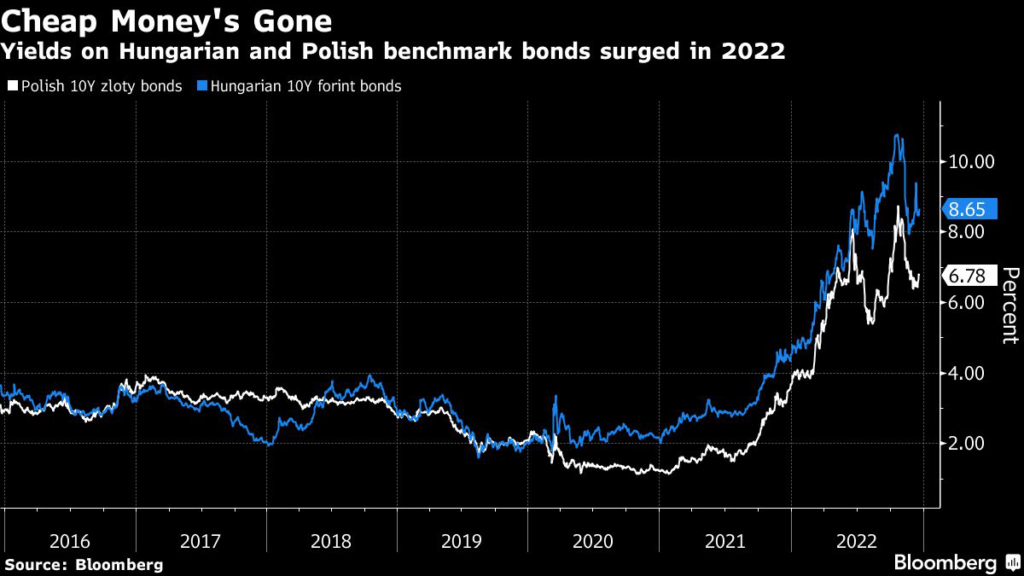In the span of 18 hours last week, years of rigid intransigence from the European Union’s two most rebellious nations melted away. First Hungary and then Poland agreed to take steps to address shortcomings in their democracies in exchange for billions of euros of funding that the EU is withholding.
(Bloomberg) — In the span of 18 hours last week, years of rigid intransigence from the European Union’s two most rebellious nations melted away.
First Hungary and then Poland agreed to take steps to address shortcomings in their democracies in exchange for billions of euros of funding that the EU is withholding.
This was, perhaps above all else, a testament to the new-found powers of the bond market.
In an era of soaring inflation and rapidly rising borrowing costs, bondholders have the ability — for the first time in years — to exert pressure on governments whose policies concern them.
Exhibit A of this is famous by now: Liz Truss’s rapid downfall in the UK.
In the EU, Hungary and Poland — both ruled by leaders accused of democratic backsliding — cause particular angst.
So when the selloff in bonds heated up this year, the two countries were particularly hard hit.
Hungary’s benchmark yields — which set the interest rate they pay for fresh financing — surged 4 percentage points this year, the most among all EU nations. Poland isn’t far behind with a nearly 3 point jump.
It was easy for Hungary Premier Viktor Orban to snub the EU, when he could borrow at a yield of, say, 2%.
With local rates now near 9%, though, the calculus changes. That free money suddenly has greater appeal.
“The flexibility that Hungary and Poland had in terms of policies is now gone,” said Malin Rosengren, a bond fund manager at BlueBay Asset Management in London.
“When rates were low, you could have thought they were insulated, but that’s no longer the case. Bond rates carry a lot of weight now.”
Cost of Defiance
Late on Dec. 12, the EU agreed to a conditional funding deal for Hungary in exchange for Orban pushing through further anti-corruption measures and bolstering judicial independence.
These measures, of course, aren’t nearly enough to mollify all of Orban’s critics. But the deal nonetheless signaled enough of a detente with Brussels to immediately ease investors’ worries. Hungary’s currency, the forint, jumped the most in two years and local bond yields dropped the next morning.
Then that afternoon, Polish officials said they had reached an agreement with the EU over how to row back changes to its courts, which the bloc said gave politicians too much sway over judges.
This briefly stoked a bond rally there, too, but market sentiment sunk once again when the legislation was shelved until at least next month, as government officials sought more consultations.
For years, the EU has struggled to force member nations that strayed from its democratic principles back into the fold.
In late 2020, the bloc extended its palate of mainly political penalties to include the withholding of funds for nations that don’t meet certain criteria. With yields surging, the cost of defying EU largess is now starting to sting.
The 27-nation bloc is effectively withholding €35.4 billion ($37.6 billion) in Covid recovery funds from Poland, or about 5.6% of the nation’s gross domestic product.
In Hungary’s case, a total of €12.1 billion in pandemic aid and other funds are frozen, some 7% of output. Even with last week’s breakthroughs, the EU money may still take many months to trickle in.
“Financial markets have more of a say now, and they can punish governments for policy mistakes by not buying their bonds or currencies,” said Mariann Trippon, an analyst at Intesa Sanpaolo SpA’s Hungarian unit.
This isn’t lost on policy makers.
Poland is “under scrutiny” of the financial markets amid the standoff over EU funds, Prime Minister Mateusz Morawiecki wrote on Dec. 17. The country’s perception in the financial markets depends on the progress of talks with the bloc about access to aid, Poland’s powerful ruling-party chief, Jaroslaw Kaczynski, told Gazeta Polska on Wednesday.
Credit Quality
Forecasts for a recession in Europe next year, which is set to boost public spending, make access to EU funds even more important.
While the bloc’s aid is meant largely for longer-term public investments, their absence would force governments to either cut the projects or finance them increasingly with funds raised on debt markets.
Yields in Hungary and Poland may rise after headlines suggesting further disruptions with EU funds, the damage will likely be limited, according to Stefan Weiler, the head of debt capital markets for central and eastern Europe, the Middle East and Africa at JPMorgan Chase & Co.
The governments won’t have any trouble selling new bonds, he said.
“As a fixed income investor, your main concern is whether you can get back your money or not,” Weiler said.
“These disagreements did not affect the credit quality” and are “already in the prices,” he said.
The economic situation in Hungary is dire, especially after it was forced to hoist interest rates to 18%, the highest level in the 27-nation bloc, to shore up the forint and allay fears of spiraling inflation.
Orban has also moved to curb the fiscal deficit after elections in April, rolling back energy subsidies and introducing windfall taxes on selected industries.
“Going against long-term economic interests has been politically very beneficial in these countries,” especially when borrowing costs were low, said Viktor Szabo, who runs an emerging-market bond portfolio at Abrdn Plc.
“Now, there’s just too much at stake.”
–With assistance from Selcuk Gokoluk, Piotr Skolimowski and Zoltan Simon.
(Updates with latest markets from fourth paragraph.)
More stories like this are available on bloomberg.com
©2022 Bloomberg L.P.










